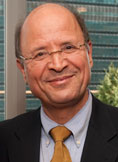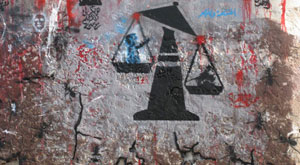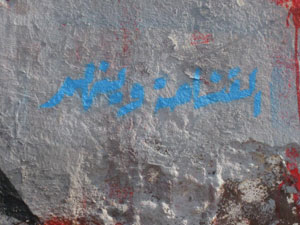
I visited Tunisia, my home country, twice since the revolution. During the first visit in June, I was overwhelmed by the many dramatic changes in the daily lives of people, both at home and on the streets. I will mention just two.
The first change was the scant presence of the once omnipresent predatory police in roundabouts, street corners, highways, and government buildings. The oppressive fear their presence used to generate was palpably absent. Unlike the army, their perceived blind or coerced allegiance to the former repressive regime created a chasm between them and the people they were meant to serve and protect. Despite public relations efforts on their part to change their tarnished image, police officers were still distrusted. So they stayed out of sight and confined themselves to discreet patrols and strictly legal duties, straining to be amiable and self-effacing in their interactions with the population. To address the recurrent security problems and intercommunity clashes, the transitional government resorted to the army or joint task forces composed of police, gendarmerie, and the army. Clearly, a radical reform of this security component will need to take place as a matter of priority before the broken relations between the people and the police are restored.
The second change that struck me was the explosion of new local daily newspapers, weeklies, and magazines on display on newsstands everywhere, covering a range of social and political issues that would have been judged subversive under the previous regime. New, private radio and TV stations were also on the air with many more in the pipeline awaiting approval. Creative and provocative TV shows seemed to be the norm. Some were looking retrospectively at the criminal activities of the previous regime, others chronicling the corruption cases being tried and excoriating judges and defenders for lack of independence, shoddy proceedings, or lenient sentencing. Still others were grilling novice and veteran political leaders alike about contradictions in their party manifestos and public statements. Ministers were being questioned about the myriad problems confronting the country from insecurity, joblessness, and a corrupt justice system to inequities in wealth distribution. Even the seasoned, respected octogenarian interim Prime Minister Beji Caid Essebsi was not spared scrutiny and criticism.
 |
|
Graffiti in Chebba, Tunisia represents a rebalancing of the scales of power in that country.
|
The same liberating winds seem to have filled the sails of theatre producers, literary writers, singers, and even street artists who turned some provincial gutted buildings of the former ruling party and blank walls into gigantic canvases. See a sample to the left.
Admittedly, in some papers people went overboard. Sensationalism and unethical practices occurred and were decried by the Ministry of Interior, which during the previous regime would have shut the paper. “Sure, there were excesses in this freedom binge,” said one educated taxi driver. “It’s inevitable. We were in a pressure cooker, and suddenly the lid was off!”
So much has been written about the catalytic role of social media before and during the revolution. What I did not know was how widespread its use after the revolution has become. For example, of the 100 or so political parties, 46 have websites, 70 have Facebook pages and at least 10 have online publications. And TEDxCarthage, a local adaptation of the idea-sharing TED Talk, had already held its second event and was planning a third for late September on the subject of tolerance.
Suffice it to say that during that first visit, I felt like the entire nation was having a free-for-all conversation with itself, virtually and in every other way…an unprecedented phenomenon after five decades of fear-induced intellectual and political coma.
CONVERSATIONS WITH UNIVERSITY STUDENTS
During my second visit in August, I decided to let these and other general impressions settle in and to be more in a listening mode. So I directed my attention to some university students, who lived through the revolution and were experiencing its aftermath with mixed emotions. I struck up conversations with some of them at random, during my stay in Tunis and in the course of visits to my extended family in other parts of the country.
Angry, Unemployed, but Free
We discussed a range of issues of concern to them, from the indignities they endured under the previous regime to freedom of speech, women’s issues, and education. All of them lamented how theirs was almost a lost generation. Over the last twenty years or so, they only knew one regime that they felt had tried to groom them into “political illiterates,” brainwashing them through daily slogans of “how democratic the country was, how free and transparent the voting, how men and women were equal.” They were distracted by multiple leisure activities and affordable nightlife. They had rather easy access to the internet despite the former government’s desperate attempts to control such access and prevent alternative narratives on the prevailing situation. The government “watchers” were said to have “underestimated” the education of the minds derived from the internet and Facebook. Nonetheless, the fear of the political police compelled many to adopt the proverbial stance of seeing nothing, hearing nothing, and saying nothing. “Even walls had ears embedded in the stones,” they said. Free speech could put your life in danger as many who had languished in state prisons could tell you. One of the students recounted the story of the host of a children’s TV show who was sacked and subsequently persecuted solely because he said to one child that one day she would marry a president, given that her ambition in life was to be a hair dresser. Reportedly the president’s wife was not amused. She had been a hairdresser.
Anger was palpable in the voices of these young people. They were angry at the inequities and the destruction left behind by the deposed president, his wife, and her family. They were impatient to see those who had stolen from the people, who had tortured and repressed be brought to justice. State institutions, they felt, had become the private property of those in power. Power for the few mattered more than governance for the benefit of the majority. They felt they could no longer trust these institutions. They pointed out that the transitional government was doing its best, but was not addressing the expectations of the people.
The previous regime had boasted about the high level of literacy the country had achieved over the years and about the high percentage of students going to the university and to various specialized technical schools, both public and private. They felt that despite the ongoing efforts of the current transitional government, the reality behind the statistics told a different story. According to one student “higher education, the social elevator to jobs, is broken.” There were no jobs to be had out there in this emaciated economy. “In fact, the higher the university degree, the fewer are the chances of finding one.” Many of those who were lucky to get permanent jobs, they claimed, tended to be the ones with family connections to the ruling party or the “ruling family.”
For young women, the priority is to safeguard the human rights of women and better use the human capital they represent. During the previous regime, they were showcased and exploited for personal, political gains or for propaganda purposes for the benefit of the outside world. “We need to repair the intellectual damage done to Tunisian women,” one said, “women should no longer be expected to applaud decisions taken by men. Women were wasted assets. We, men and women, need to recover those assets for the sake of a free, just, democratic, and prosperous Tunisia.”
They decried the recurrent insecurity still prevailing in some outlying regions of the country. They feared that the intercommunal violent clashes between traditional families in some towns and rural areas could tear apart the social fabric of those communities.
They felt that despite these problems, the revolution had empowered them to speak their minds freely about political issues without fear of retribution. They could now dare to dream again—but not with some of the older men that are leading many of the political parties or are in the current transitional government.
Immediate Priorities for the Future
While recognizing that revolutions require long years before ushering in a new order, the students strongly felt that work needed to start on the following immediate priorities:
• The creation of jobs for the masses of the educated. One way to do this is through the creation of a propitious and equitable environment for the private sector to thrive. There is only so much the public sector can do to address this problem.
• The reform of the justice system is a long-term project, but transitional justice must start now. There is an urgent need to address the painful legacies of the previous regimes and the crimes committed by it during the revolution.
• The reform of the educational system, focusing on those practical skills that will actually prepare students for the job market and ensuring that only competent and “clean” school administrators, directors, and deans of schools and universities are reappointed.
• The reform of the rule of law and human rights.
• The fight against corruption and the recovery of stolen money and property and ill-gotten businesses.
• The reform of the security sector and a start in improving security ahead of the elections.
• The removal of all obstacles in the way of achieving equality between men and women. The next government should be less “masculine.” In their view, there can be no democracy without equality.
• The promotion of unity, dialogue, and reconciliation.
OBSERVATIONS
The Gender Equality Issue
Women in Tunisia constitute 51 percent of the electorate and the majority of the magistrates, the medical and teaching professions, yet only 10 percent of them are represented in political institutions. The current transitional government has only two women ministers out of twenty-three and the Independent Electoral Commission charged with organizing the October 23rd Constituent Assembly elections has only two women out of twelve members. No woman has been appointed provincial governor. Even though they fought alongside men during the revolution for freedom and dignity, Tunisian women fear that the rights they had enjoyed over the past decades could be reversed, given the current uncertain political transition. It’s against this background that Tunisian women and committed men fought for and got parity on political party lists. According to the new electoral law, parties are now required to field equal numbers of men and women on their lists and alternate them so that women have an equal chance of being elected to political office. This constitutes a vindication of their motto, “quotas are a favor but parity is a right.” In August, following several rallies, the Tunisian Transitional Government voted to lift the reservations expressed by Tunisia in the early 1980s against certain provisions of the 1979 Convention on the Elimination of All Forms of Discrimination Against Women (CEDAW), thus opening the door for women to potentially enjoy all the rights stipulated in that international convention in the near future. For many of these women, the above advances, while notable, are only the beginning. They need to be anchored in domestic laws, including in the new constitution.
 |
|
“The snipers, where are they?” is the English translation of this graffeti in Chebba.
|
The Youth Bulge and Unemployment
Close to one third of Tunisians are in the fifteen- to twenty-nine-year age bracket. Most of them are educated, and nearly 30 percent of them are unemployed. Currently 170,000 Tunisian graduates are without a job. Nearly 8,000 a month are looking for jobs. With an economy hovering near a negative growth of three percent, youth unemployment constitutes a huge challenge for the current government and will remain so for the next one. In an attempt to cleanse the educational institutions of the legacies of the previous regime, the transitional government has reviewed the entire cadres of administrators running primary and secondary schools as well as universities. It appointed or reappointed only those that fit certain stringent criteria of competence and integrity.
Justice and the Rule of Law
Seeking accountability for past egregious human rights violations has been recognized as an essential step towards helping Tunisia transit to a just and democratic society. Extensive discussions on transitional justice issues have already taken place. The current transitional government has set up different mechanisms to address pressing grievances relating to corruption, embezzlement, and human rights violations. And the various courts have have already issued sentences against a number of individuals, including the former president and his family, albeit not to the satisfaction of everyone. In August, Tunisia deposited instruments of accession to the Rome Statute of the International Criminal Court to the UN secretary-general, thus becoming the first North African country to do so. The statue has already entered into force. In early September, the Tunisian Human Rights League, after an eleven-year hiatus during which its members had endured the full wrath of the previous regime, held its sixth congress with the active participation of the prime minister of the transitional government. The latter had enabled the league to open offices throughout the country using government-owned buildings, an unthinkable prospect before the revolution. The government has also approved the request of the UN high commissioner for human rights to open an office in Tunisia.
The Forthcoming Elections of the Constituent Assembly
The Constituent Assembly Elections will take place on October 23, 2011. The assembly is tasked with drafting a new constitution and appointing a new interim government. The next presidential and legislative elections are tentatively scheduled for October 2012. A public opinion survey conducted in August found that 57 percent of Tunisians polled are dissatisfied with the security situation and 61 percent are unhappy with the economic situation. Less than two months before the elections of the Constituent Assembly, two-thirds feel that the political parties (over 100) do not represent them or reflect their views. The poll also revealed that while approximately 72 percent of Tunisians are planning to vote, two-thirds have not yet decided for whom they will vote. Another poll conducted in early September revealed that in terms of voter intentions for political parties, Ennahdhah, the Islamic-leaning party, leads at 22.8 percent, followed by a center-left party as a distinct second. It’s hard to tell whether these voting intentions reflect the choices that will be made on October 23rd.
Also as of early September, the current transitional government has taken stringent security measures to ensure that the elections take place in a free, fair, and secure environment. This is to complement the measures taken by the Independent Electoral Commission towards the same goal, including the training of over 6,000 electoral observers.
CONCLUSION
The Tunisian transition, not unlike others that have preceded it, conveys the essential truth that no one can predict just where it is heading. The volatile regional context makes it even more difficult to hazard a guess. What is heartening to see is the collective determination of a society free at last to lay the foundations that will help it to peaceably manage both the predictable and unpredictable consequences of such a transition for the years to come.







